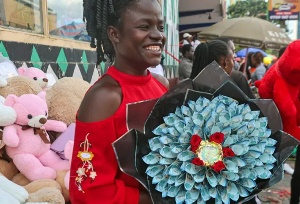Tickling the Tales
Each time a writer digs into his resources and brings out a story, humanity is
largely, well- served. But it first begins with curiosity and plenty of generosity.
In other words, one must first be interested in observing the human situation, and
care enough to share.
Tales from Different Tailssets out exactly to achieve this. In this selected work of
fiction, Nana Awere Damoah gifts the world with his and our story and tells them in
terms that enable us relate effectively. Set in contemporary Ghanaian society, the
stories are themed on fate, romance, love and camaraderie betrayed.
There is an inherent relationship between mankind and the literary phenomenon known
as the ‘story’. This link is instinctive, almost biological. Whether told by the
African fire side setting or from the Western-styled Uncle Arthur’s bedside, every
child grows up loving tales of adventure and intrigue. In any narrative, the phrase
‘once upon a time…’ is one that tickles the ear and prepares us for the juice of
news.
The truth, really, is that we live in a world that floats on stories. Functionally,
storytelling is very much what nearly all the professions do. Explaining this is not
a hard nut: the simplest form of sharing information is through story-telling.
Take journalists. After they have researched and gathered news materials they have
got to tell the story. Same with our scientists, historians, statisticians, teachers
and preachers. To a non-negotiable extent, the success of these vocations depends on
how well they tell their stories.
Happily, inTales from Different Tails, the stories are very well told. Indeed, what
the author has done is to use the story telling techniques of the various
professions to thrust the plots forward. The result is a compact, adrenaline-driven,
easy to read work.
The main setting for many of the episodes is the university campus. The tertiary
level is the last formal arena for preparing our leaders for various fields of
encounter. The interactions and experiences that take place behind those walls are
thus instructive for a nation.
The author shows an understanding of human insight such that he is able to switch
the narrative voice from the girl on campus, to the street hustler and then the
medical doctor; all in virtually one breath. His use of relevant concepts and
jargons helps to unlock the door to a world all its own.
This book makes the ordinary worth celebrating. In part, the author fuels his
narratives on nostalgia. For someone who happened to have grown up in the Accra
Newtown-Kotobabi area myself, the landmarks and encounters are truly a home drive to
familiar warmth.
All told, Tales from Different Tails is also serious commentary on societal
shortfalls. It is the story of a nation that has not done very well for the
citizenry. Facilities such as public transport and public places of convenience make
mockery of our human dignity. This book also teaches that trust is a must, betrayal
does not pay and love is beautiful.
But that is not all. There is a bonus that runs through. Humor. In this delightful
work, Nana Awere Damoah demonstrates that he has a soft spot for the funny side and,
(to the advantage of the reader) he has much difficulty keeping this to himself.
As people of a great heritage, we have to tell our stories- each of them, all of
them. For this is a culture that leads to the road of self-knowledge critical for
the national development agenda.
KOFI AKPABLI
CNN African Journalist for Arts and Culture
(Winner for 2010 and 2011)
Opinions of Tuesday, 8 November 2011
Columnist: Akpabli, Kofi














